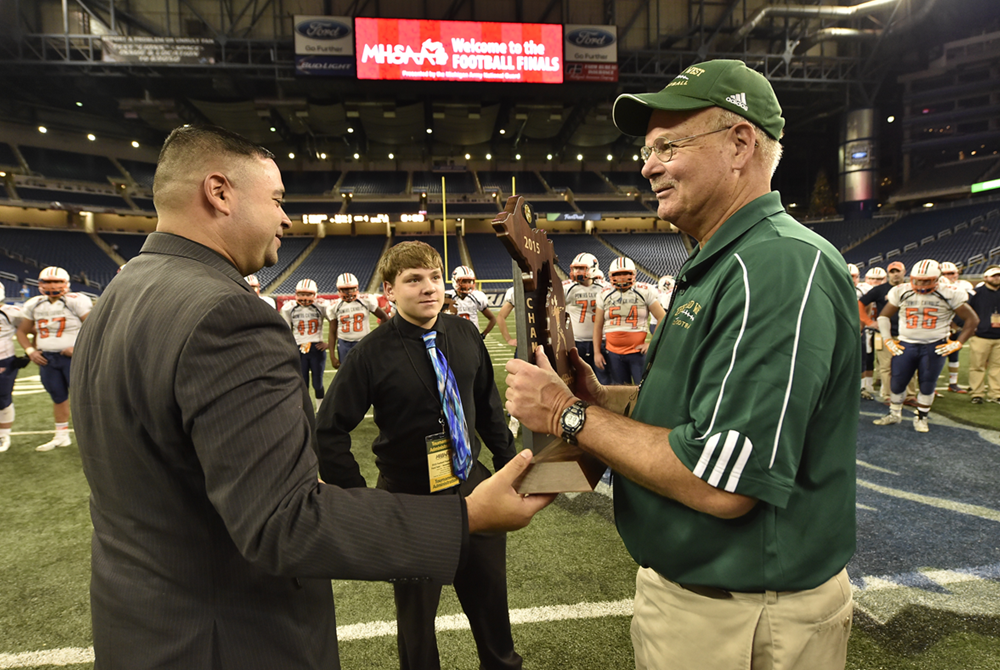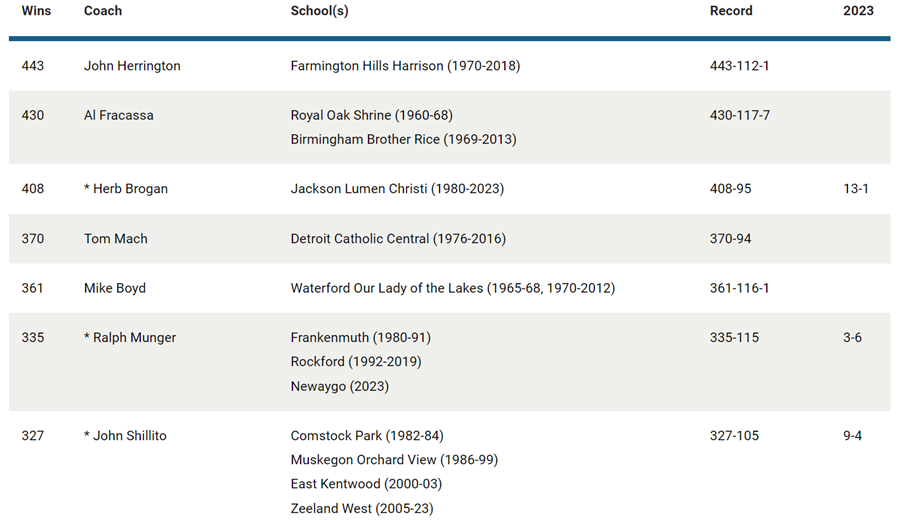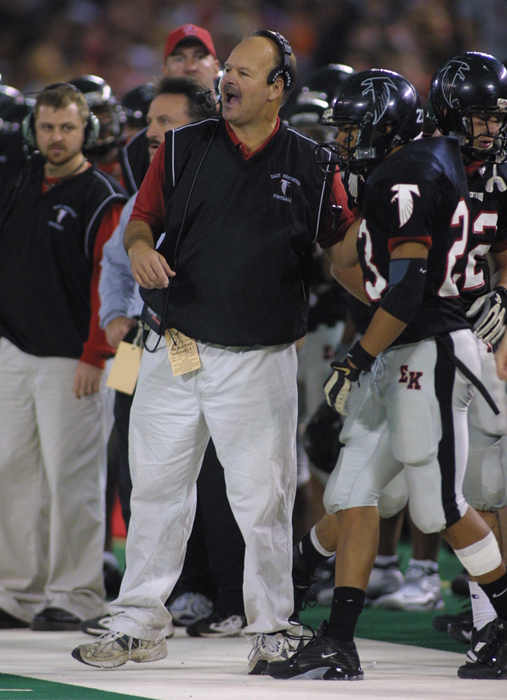
Lessons Passed Down the Coaching Tree
July 18, 2013
By Geoff Kimmerly
Second Half editor
Lessons, like legends, are meant to be passed from generation to generation.
And just as parents hand them down to their children who then do the same, coaches teach athletes the best of what they learned as athletes themselves. Some of those athletes then become coaches as well, and in turn, educate a next group of teenagers growing up in part through their participation in sports.
As we begin to turn our eyes toward another school year beginning next month, here are a few favorite lessons taught by four recent participants of the MHSAA’s Coaches Advancement Program – with back stories on how they learned those lessons themselves and explanations of why passing them on continues to be important.
We are family
Steve Brooks
Ypsilanti boys basketball
Bio: Brooks led the Ypsilanti High School program the last 10 seasons, guiding the Phoenix last winter to its first Regional championship since 1981. He has been selected as the first boys basketball coach for the newly-formed Ypsilanti Community Schools, a merger of the former Ypsilanti and Willow Run districts. Previously, he coached three seasons at Inkster and also led that program to the Quarterfinals.
Lesson learned: Brooks was in fourth grade when he and a friend happened to ride their bike past Flint Northern’s football practice field during one of coach Fred Crawford’s training sessions. The noise and excitement and especially the defensive coaches yelling first caught the kids’ attention; Brooks and his friend ended up watching through the fence until Crawford approached and asked if they’d like a closer look. “He said, ‘Hey, you’re going to be a Viking one day, aren’t ya?’ It was so simple. But it made an impression on me as a young man, the pride and tradition of going there,” Brooks said.
Brooks’ family later moved to a neighborhood in Flint Northwestern’s district. But when the school boundary was redrawn before his junior year – and he had his choice of staying or attending Northern – Brooks remembered saying he would be a Viking one day and made the switch. Building togetherness remains a major focus of Brooks’ Ypsilanti program today, 49 years after Crawford first invited him into Northern’s football family.
Lesson taught: “At any time, our players can come in and talk about personal things and feel like they can let stuff out and it won’t go further than the people it’s entrusted to,” Brooks said. Making a connection to players begins early through his middle school coaches and remains key to building that familial trust.
It’s a philosophy that goes to Brooks’ core. “When you’re starting to coach nephews and younger brothers of players you’ve had, it’s that same type of feeling and promoting of family,” Brooks said.
Do the right thing
Heather Prentice
Portage Northern competitive cheer
Bio: Prentice has coached Portage Northern the last eight seasons and guided the 2007 and 2008 teams to the MHSAA Finals. Total, she’s coached cheer since 1986, including previous tenures at Climax-Scotts and Laingsburg.
Lesson learned: Prentice learned more from what she felt her high school experience lacked. She loved cheering – but decided as a coach to take an active role in the lives of her athletes. “I’ve matured the older I’ve gotten, and I think what’s become more important the older I’ve gotten is putting more of the focus on what I want my kids to leave with,” Prentice said.
“I’m not a parent, and I’m a person in their lives for a very short time,” she added. “But it’s a very significant period in life, and I try to carry myself as I would want them to remember me.”
Lesson taught: To that end, Prentice focuses on mixing plenty of fun with the hard work and lessons she teaches. Integrity ranks high on that list.
She’ll point out during workouts that if an athlete does 23 jumping jacks instead of 25, only that girl will know. But cutting corners, if it continues, tends to catch up with a person.
The payoff is finding out those lessons have paid off.
“The great thing about coaching for so long is you get letters or emails back from kids; ‘I thought of you today when I was disciplining my 3-year-old child,’ things like that. Or, ‘I went in for a job interview and they asked for one of my qualities. And I said I have integrity. I do have integrity, and you taught me that.’ Those are the cool moments,” Prentice said. “They really did hear me; they did hear what I am saying.
Accept responsibility
Duane Enderle
Birch Run girls and boys soccer
Bio: Enderle has coached Birch Run’s girls program since its start, and this spring led the Panthers girls to the District Final for the second time during the program’s six-season history. He also coached the boys for four seasons before taking the last two off, but will return to their sideline this fall.
Lesson learned: Enderle was a sophomore starter on his South Hagerstown, Md., team during one of the first seasons under eventual longtime coach Mike Tesla. At one point that season, Enderle didn’t make a Saturday practice – and during the next Monday’s game never left the bench.
“I learned at an early age it doesn’t matter how good you are. There’s always a consequence,” Enderle said.
Lesson taught: He’s noticed the last few seasons, both on the high school and club soccer fields, a growing number of players unable to control their emotions. “They get yellow cards and come out of a game for 10 minutes, and if it’s one of the good players it ends up hurting the team,” Enderle said.
He said this year’s Birch Run team saw a different side of him as he pushed accountability a little bit harder. It’s a lesson that doesn’t lose significance, even as athletes change over the years and push boundaries in different ways.
“That’s the biggest thing I try to pass on to them, their own self-responsibility and accounting for all of their actions,” Enderle said. “Everything they do always has consequences.”
One for all
Kim Crum
Mattawan girls lacrosse
Bio: Crum is a 2002 Mattawan graduate and played three seasons for the highly-successful softball program led by coach Alicia Smith. Crum just finished her third season coaching the school’s girls lacrosse team after previously coaching the Kalamazoo United team for three seasons.
Lesson learned: Being part of a team is a full commitment to those teammates, something Crum works to instill in her players each spring. She learned that in part as an athlete under Smith – who last season led Mattawan to its second MHSAA championship in three seasons. “With a group of teenage girls, a group of any teenagers for that matter, they form cliques and opinions of people before they get (on a team),” Crum said. “When we were on that team, there were people that didn’t agree, didn’t get along. But when we set foot in practice, for a game, we were part of a team and it didn’t matter what happened outside of there during the day. I try to tell the kids that now.”
Lesson taught: Instead of finishing practices with “1-2-3-Wildcats,” the team’s mascot, Mattawan closes with “1-2-3-Family!” Crum’s emphasis on “team commitment” also has grown through working with her assistant Matt Stephens, the school’s football coach during the fall.
Playing a high school sport often means seeing those coaches and teammates as much or more than family during that three or fourth-month span. Some of Crum’s lacrosse players have played together in the past or together on other sports teams. But she and Stephens are quick to remind them that each team, each season, is a new group with new dynamics to learn.
“Every time we do something, we look at it as how it affects the group,” Crum said. “We have to figure out how each other work. ... Be patient. By the end, we’ll figure things out.”
PHOTO: Ypsilanti boys basketball coach Steve Brooks (far right) celebrates with his team this March after leading the Phoenix to its first Regional title since 1981. (Photo courtesy of Randy Castro, Ann Arbor Journal.)

Process, Relationships Still Matter Most as 4-Time Champ Shillito Coaches 41st Season
By
Steve Vedder
Special for MHSAA.com
October 18, 2024
It was John Shillito's third year as Muskegon Orchard View football coach, and while the wolves weren't exactly knocking at the door, some faint low growls could clearly be heard.
Shillito had been successful at Comstock Park with his teams going 21-8 over three seasons, but the move to Orchard View included 3-6 and 4-5 records the first two.
While there wasn't yet widespread anxiety, Shillito recalls there was a bit of concern.
"I was much younger then and wasn't as successful yet in education," Shillito said. "But we weathered it and came through the other side. But you wonder a little; there's always a little self-doubt. I think it was important to go through it, because you can learn as much even when you're not winning."
Michigan high school football is the better for Shillito sticking it out. Two schools later, Shillito finds himself as the state's third winningest active coach and seventh overall with a 333-106 mark over 41 seasons.
His Zeeland West team is 6-1 this season and likely to become his 27th team – and 15th in a row – to qualify for the playoffs. Shillito's teams at Byron Center, Muskegon Orchard View, East Kentwood and Zeeland West have won a combined 16 conference titles.
Not bad for someone whose first love was baseball. Shillito's father, Harry, played three seasons professionally in the Brooklyn Dodgers system during the "Boys of Summer" era of the 1940s and 50s. Shillito grew up as a talented catcher in the spring and top football prospect as a defensive lineman in football. When programs such as Central Michigan, Eastern Michigan and Northern Michigan began showing an interest, the lure of a football scholarship made it an easy decision which sport he would follow.
After playing three years at Central Michigan, his coaching career kicked off with an assistant gig at Central Bucks East in Pennsylvania in 1980. He became head coach at Comstock Park in 1982.
 Shillito said the same motivation which drove him into coaching has kept him in the sport for nearly five decades. It's not necessarily winning state championships – he’s won four at Zeeland West – or fulfilling a deep competitive drive or even the lure of Friday Night Lights in a small community. It's showing up at practices, adhering to a process and building and honing relationships with players and other coaches.
Shillito said the same motivation which drove him into coaching has kept him in the sport for nearly five decades. It's not necessarily winning state championships – he’s won four at Zeeland West – or fulfilling a deep competitive drive or even the lure of Friday Night Lights in a small community. It's showing up at practices, adhering to a process and building and honing relationships with players and other coaches.
Take those away and the 67-year-old Shillito, a member of the Michigan High School Football Coaches Association Hall of Fame, would definitely be looking elsewhere to spend Friday nights in the fall.
"It's the process; I love a good practice. You know when (it's good) and when it isn't. More than even the football, it's the coaching process and the people I work with," he said.
"Winning is a week-to-week deal. This week's game is what we're all about. And then in the offseason, it's preparation for the year coming up. The state titles are always a bonus."
Which isn't to say Shillito isn't competitive. Whether it’s been playing hockey, wiffle ball, 3-on-3 basketball or backyard football with his brothers, Shillito's competitive spirit has thrived.
"Oh yeah," he said. "But I'm a glass half full-type competitor. I can find the positive side in either wins or losses. But for me it's about the preparation, no doubt about it."
Shillito's success has come even with opponents knowing exactly what they'll see offensively from his teams: the famed wing-T offense, which he's run since the mid-1990s and was taught to him by famed West Michigan coach Irv Sigler. In fact, Shillito said if there is anything responsible for his success, it's the ability to implement what he's learned from coaches as a whole such as Mike Henry, the longtime basketball coach at Orchard View, or former Remus Chippewa Hills football coach Ron Reardon.
When he first got into coaching, Shillito said the wing-T seemed the easiest to teach. He's tweaked the process over the years, but it's been highly successful for him wherever he's coached. The number of Michigan teams which run the wing-T has probably lessened over the years as passing has taken over many high school offenses. But Shillito said the run-first philosophy can still be found in pockets all over the state. Shillito said he has no second thoughts about devoting his offense to the wing-T, and the success only underscores the point.
"It can be difficult if you're not winning, no doubt about it," said Shillito, who figures he's coached about three dozen 1,000-yard rushers. "But the value in the system is that it's an easier process. That is, if you get a buy-in from the players and community. We've had that at Zeeland West."
 As the sun begins to set on Shillito's coaching career, he's hard-pressed to pick his best, favorite or most surprising teams. For starters, there's the 1983 Byron Center team which reached the Class C Semifinals, or the 1995 and 1999 Orchard View teams which played in Class B Finals and combined for a 24-3 mark.
As the sun begins to set on Shillito's coaching career, he's hard-pressed to pick his best, favorite or most surprising teams. For starters, there's the 1983 Byron Center team which reached the Class C Semifinals, or the 1995 and 1999 Orchard View teams which played in Class B Finals and combined for a 24-3 mark.
Or maybe the 13-1 Division 1 runner-up club at East Kentwood in 2002, and the 2006 Zeeland West team which claimed the Division 4 title after winning its last 11 games by an average of 35 points per. Or the 2011 Zeeland West team which went 14-0 to kick off a phenomenal five-year stretch during which the Dux went a combined 60-6.
Ask Shillito about any of those seasons, and his answer as to what he remembers most about his coaching career may be surprising. Many of his most cherished moments include his teams going just 5-6 over the years against Muskegon, including three playoff losses that ended the Dux's season. Balance that with his record against other programs, such as a 73-16 mark against other Lakeshore teams, including an 18-7 record against rival Zeeland East. Or a 10-4 record against traditional Grand Rapids-area powers such as Lowell, Grand Rapids Catholic Central, South Christian, West Catholic and Hudsonville. In the postseason, Shillito's teams are an amazing 54-22 over 26 seasons in the MHSAA Playoffs.
As for knocking heads with Muskegon, Shillito said the thrill of a great rivalry and the consistency his teams have shown over the years is what has always driven him.
"It's the longevity and consistency," Shillito said. "I've gotten to work with great people who have had an equal share in this. I've had such a wide variety of guys I've worked with in four programs, and it’s meaningful. "
He is coy on when he might finally call it a career. He could wake up tomorrow and decide it's the time, or it could be next week, the end of the season or maybe one more season. Who's to say?
"We're getting close now," he will say. "We're always in the moment; that's just where we are. Then we'll evaluate things after the season. That's been true now for several seasons."
PHOTOS (Top) Zeeland West football coach John Shillito, right, receives the Division 4 championship trophy from MHSAA Representative Council member Orlando Medina in 2015 at Ford Field. (Middle) Entering this season, Shillito ranked seventh all-time and third among active coaches for football victories in the MHSAA record book. (Below) Shillito prepares to send in one of his East Kentwood players during the 2002 Division 1 Final at Pontiac Silverdome. (MHSAA file photos.)

